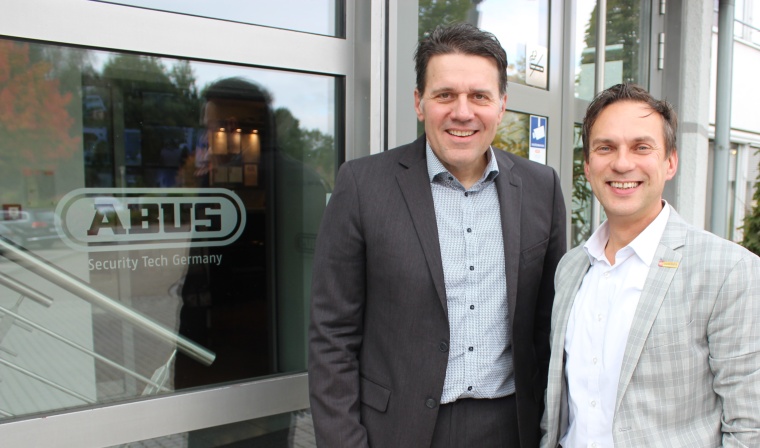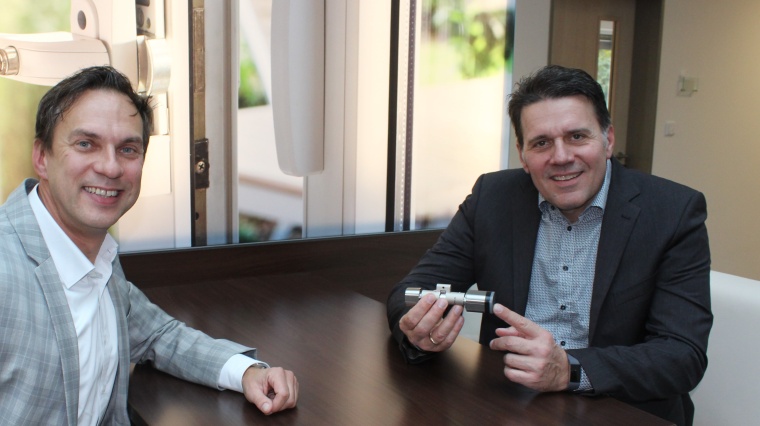Security & Digitalization - Interview with Martin Bemba, CEO of Abus Security Center


Intruder protection, video surveillance, access control & co. – they are increasingly blending into other systems within a building, such as the window control and the lighting systems. But the security technology should always play the primary role, says Martin Bemba. Some weeks ago, more precisely before the current corona situation, GIT SECURITY spoke with the CEO of Abus Security Center about security technology in the era of digitalization, about partnerships and alliances, about innovation and growth plans.
GIT SECURITY: Mr. Bemba, the readers of GIT SECURITY have known you for many years in management positions within the security industry, and as a member of the board of the ZVEI. You have been Chairman and Managing Director of Abus Security Center since May 2019. How have you enjoyed your time and what sort of company did you discover?
Martin Bemba: Abus is a family-run company with a long tradition, which brings obligations with it. The employees of Abus Security Center have fully understood the subject of security. I have come to know a company that maintains a respectful appreciation of its employees – and also of its partners and customers. This influences the company culture at Abus. Added to that, there is an orientation to long-term goals and the corresponding investment. Short-term shareholder-value thinking, such as can be found in many larger concerns, has no place here.
By appointing you, Abus Security Center wants above all to continue and strengthen its digital strategy in the areas of electronic security and building technology. The company has already made great strides in recent years with the enlargement of its portfolio with IP technology and the consolidation of its alarm, fire protection, video and access control activities under the Abus Security Center name. What new priorities do you want to set, according to your experience?
Martin Bemba: I can see a number of things that we want to drive forward together. The subjects of User Experience (UX) and Installer Experience (IX) are, of course, important here. We must also have our installers and our end customers equally in focus – and both are highly exciting matters for which we have developed policies. Don’t start your thinking from the problem, rather ask yourself what does the customer want - that summarizes our way of thinking.
Could you give us an example?
Martin Bemba: Take the owner of a family home. What he wants is to protect his house and his valuables. For us, this means that, for example, he no longer has to activate and deactivate his alarm system. As soon as he gets near, the door will automatically be unlocked, the light goes on, and so on. We want to make this intuitive operation of a Smart Home possible. And we’re always also thinking about other systems, for example in conjunction with “Senior Care” and “Baby Care”. We must always include interfaces to non-security devices as well. But security must always be encapsulated so that the security technology itself stays secure and reliable. Even if the security technology should always play the primary role, there should also be other interfaces, to the window shutters, to the music system, etc. And amongst all this, we want to emphasize that digitalization also means saving costs: it’s all about security, but also about energy efficiency, about sustainable living.
Another matter that we will pay more attention to is the partnership with the installers. We want to support in particular the many smaller installers with the realization of corresponding business plans. At the end of the day, it’s all about taking everyone on the journey – the installers and naturally also the end users - with good business models and easy-to-use products.
Let’s have a look at the subjects of standards and partnerships. What are you doing currently about these?
Martin Bemba: In general we consider new partnerships to be necessary. The reason for this lies above all in the fact that, from our point of view, no particular standard has become dominant. We naturally have to serve all the existing standards such as Z-Wave, etc. But it’s important to remember that security is a differentiated domain. In particular, no security-sensitive data must be allowed to be transferred, for example when a light is supposed to be activated by an alarm. We therefore work with a cloud that we host ourselves. We are already demonstrating such partnerships under our ‘Smart Friends’ program. But we can also imagine a ‘Security Alliance’, similar to the ‘Star Alliance’ of the airlines. We’re looking here for partners that will provide problem-free Plug & Play and very good interconnectivity.
Mr. Bemba, at Abus Security Center you have a multidisciplinary R&D team for digital building technology. Which areas of expertise are represented, how large is this team and what is it working on exactly?
Martin Bemba: all the relevant areas of expertise are represented: software, hardware, firmware, mechanics, and also external partners. We place great importance on the User Experience (UX) – and with this we mean far more than just the individual products. We look at the whole chain, from the first call right through to holding the product in your hand and using it. This is about total solutions for security technology with access control, video and alarms, including totally new aspects such as sensors and artificial intelligence. So we will build strategic partnerships for these: quite a lot is created these days in exclusive, small start-ups – we then want to make these innovations available to a larger public. In total, we employ some 50 people internally in Affing – a still larger number works externally at our technology partners and providers.
Let’s also talk about products – what would you consider the most important recent innovations?
Martin Bemba: We have a lot of great new products ready to go – such as the Abus Wlan Accu Cam that has just been launched on the market. It can deliver video surveillance in or to a building without any cables. The camera is suitable for use outside and provides excellent images – even at night. The images can be sent and stored on an SD card or a mobile phone – via a push message or actively to watch – including the ability to talk back.
There are similar products available from other suppliers...
Martin Bemba: … but we really do have some unique selling points to offer. For example, our Wlan Accu Cam can be recharged within just four hours – for a subsequent operating time of the camera on up to 13 months. In addition, we offer the advantage of data storage on an SD card, internally and securely, even if the router should fail. With regard to access control, we also have a great new system: wAppLoxx Pro can also be used for larger properties. We will also introduce a new alarm system - this was originally planned for March at the now postponed Light + Building 2020 event - as well as another version at Security 2020 in Essen in September. It is a system that consolidates the various security systems of a building, and provides additional intelligent building applications.
There is increasing concern about subjects like cybersecurity, data security, and hacker attacks – also within Abus Security Center?
Martin Bemba: Secure stays secure – that means that Abus systems are encapsulated and will always be so.
Your extending your financing options; amongst others, there is the a Lifecycle package?
Martin Bemba: A new finance scheme is first of all the ability just to pay for what you actually use. For example, those who are nearly always at home have different needs to someone who is always traveling. If the house is empty and unguarded, I’ll need some more security measures – that’s different if I’m at home anyway. We offer finance plans for intruder protection systems through the KfW (lit. ‘Kreditanstalt für Wiederaufbau’ - the German state bank for the finance of development). The customer can also choose particular services as and when they are required; for example if the family grows. And if I go on a longer holiday, I might need - or most definitely need - more protection for my house, my apartment or my office.
Mr. Bemba, you have determined significant growth to be the primary aim of your company. How are you going to achieve this?
Martin Bemba: the keywords for us here are digitalization and integration – in addition, new products and technology such as KI are on our agenda, and in particular special products for special target customers. We will also stimulate growth through international expansion. The installer and end-user sales channels are equally important to us. We will be focusing mainly on private households as well as small businesses through the installer channel, although we will still be involved in larger projects. And that applies to all our systems. We cover the complete range – from an individual family home right up to large project tenders. It is important for us to communicate that Abus is not only a synonym for security, but also one of the very few companies – if not the only one – that combines mechanical and electronic systems the way we do. Abus already offers a highly secure product against burglary that can prevent an intruder from even getting into a building by giving massive mechanical resistance and using modern alarm technology. To combine this with convenience and the ever more frequently demanded interoperability is a logical consequence that will gain importance.
You were awarded the Red Dot Design Award 2019 for Abus surveillance cameras last summer. How significant is design for Abus Security Center and its customers?
Martin Bemba: The design of our products is very important. Our products are visible, and everything that is placed in a room must look stylish. But design at Abus is a lot more than just that. As I mentioned at the beginning of this interview, both the Installer Experience (IX) and the User Experience (UX) are crucial for us. Our product designs are therefore fundamentally so conceived that they look good, and also completely satisfy both the installer and the user when they are installed, put into operation and used.
What can we expect to see from your firm during 2020?
Martin Bemba: Apart from the new items I mentioned, we can see some consolidation of products. Customers don’t want five separate apps for each device. They would like unification of different systems.
I’ll take just a small excursion into the world of Abus beyond the Security Center if I may, because there are also quite a few security innovations to be found here too. Some examples would be not only the front door of the house that I can unlock via Bluetooth, but also the Abus cyclist’s helmet that recognizes when the wearer falls. I’ll have a good feeling of safety and security knowing that I, or those that are dear to me, will be helped quickly after a nasty fall.
Mr. Bemba, many thanks for the conversation.
This interview was conducted around the turn of the year 2019/2020.
most read

Assa Abloy's battery-powered Aperio KL100 secures lockers
Boost workplace security and operational flexibility by securing more than just doors.

Safety and Security in an Emergency: How companies take responsibility with strategic personal protection and amok prevention
Personal protection & amok prevention: strategic concepts, training & responsibility for corporate safety and security

Is Your Venue Ready for Martyn’s Law?
Martyn’s Law demands stronger security by 2027. Is your venue prepared to protect and respond?

Airbus Defence and Space: Security as a strategic pillar of Europe's defense capability
Airbus Defence and Space protects sites, technologies and employees with modern security and cyber solutions - strengthening Europe's resilience in uncertain times

Integrated and Futureproof: Traka’s Next Chapter
Interview with Stefni Oliver on Traka’s Vision for the Future








